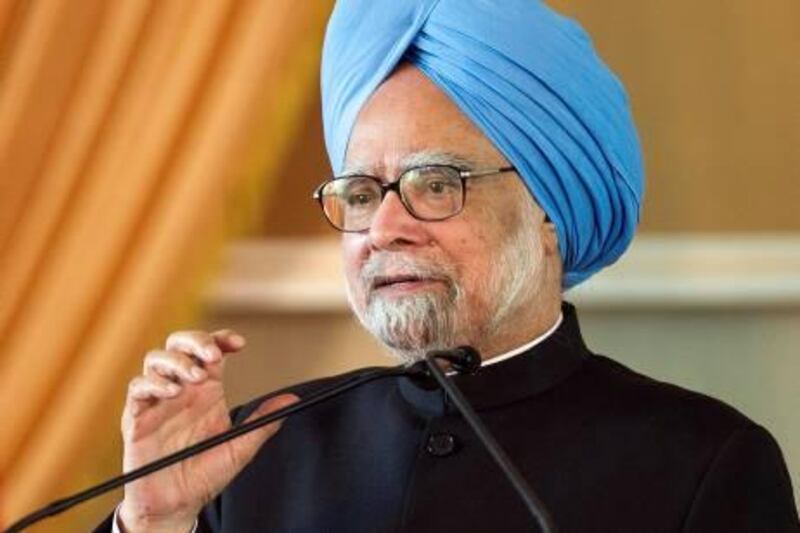India's prime minister told the country's Supreme Court in an affidavit yesterday that he had done nothing wrong and had followed procedures regarding a scandal over the sale of telecommunications licenses below market prices.
The court had asked the prime minister, Manmohan Singh, to explain why he took nearly a year to respond to requests for the prosecution of former telecommunications minister Andimuthu Raja, who is accused of selling the licenses too cheaply to undeserving businesses, potentially costing the state up to US$40 billion (Dh146.9bn). Mr Raja, who resigned last week, has denied the accusations.
In the affidavit, whose partial contents were reported by the Reuters news agency, the prime minister said he had done "all that was required in the interest of probity".
On Tuesday, India's attorney general, GE Vahanvati, will appear before the Supreme Court on behalf of Mr Singh to reply to questions about how he handled the request to probe Mr Raja's actions.
Mr Singh told a leadership summit in New Delhi yesterday that several investigating agencies were looking into the issue. He said the guilty would not be spared.
"There should be no doubts in anybody's mind that if any wrong thing has been done by anybody, he or she will be brought to book," Mr Singh said. "We need to deal effectively with the threats of corruption."
The Indian parliament has been deadlocked for the past 10 days over opposition demands for an investigation into the sale of the second-generation telecoms licences in the world's fastest-growing mobile phone market.
"We are ready to discuss all issues in parliament. We are not afraid of discussion," Mr Singh said yesterday.
Last Tuesday, the state auditor issued a report saying the sales went against the government's wishes for a transparent bidding process and resulted in significant revenue losses.
Mr Raja awarded licenses in a way that "lacked transparency and fairness," according to the report, which also implied that Mr Raja favoured some companies.
Mr Raja is a member of the DMK, a regional party from Tamil Nadu that helps give Mr Singh's Congress party a majority in parliament. The opposition claims Mr Singh failed to act because he feared upsetting his coalition partner.
Corruption has long been a major problem in India. The ruling Congress party has pledged to crack down on graft, but it has been put on the defensive in recent weeks when it was forced to fire three senior officials over corruption allegations.
India was ranked 87th in Transparency International's 2010 ranking of 178 nations based on the perceived level of corruption. Rival China is ranked higher, at number 78.
"The telecom scam is the most serious crisis faced by the government in the last six years," Mahesh Rangarajan, a political analyst and professor of history at Delhi University, told Agence France-Presse, referring to the start of the present coalition in 2004.
"It has now become a question of credibility," he said.
Sonia Gandhi, the president of the Congress Party, said Friday at a conference in New Delhi: "our economy may be increasingly dynamic, but our moral universe seems to be shrinking, Graft and greed are on the rise," she said.
"The principles on which independent India was founded, for which a generation of great leaders fought and sacrificed their all, are in danger of being negated."
Senior members of the Congress party have rallied around Mr Singh, saying he has done nothing wrong and discounted rumours the prime minister was planning to resign.
"There has been no damage to an honourable man held in the greatest esteem by the country," said the Congress party spokesman, Manish Tiwari.
Commenting on the pressure he is under, Mr Singh said at the leadership summit: "it is often said these are testing times. In fact I cannot help feeling that we in India are living always through testing times. Indeed as prime minister, I sometimes feel like a high-school student going from one test to another."
[ foreign.desk@thenational.ae ]
* With additional reporting by Reuters, AFP, The New York Times and AP





